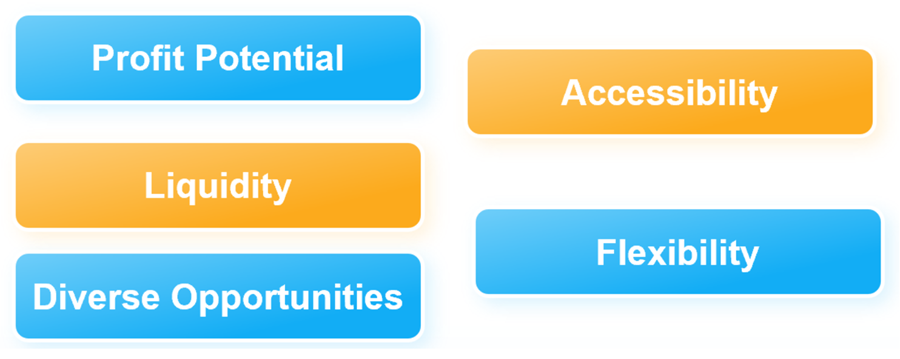
Financial trading involves buying and selling securities in various markets. It offers opportunities for profit but comes with inherent risks. Understanding both the benefits and the potential pitfalls is crucial for success.
1. The benefits of financial trading
Financial trading has many benefits that attract a large number of traders. Here's a summary of some key points:

Profit Potential: Through price fluctuations, traders can earn significant returns on their investment.
Liquidity: Many financial markets offer high liquidity, allowing for quick transactions.
Diverse Opportunities: Traders can choose from stocks, bonds, forex, and commodities, enabling portfolio diversification.
Accessibility: Online trading platforms have made it easier for individuals to participate in financial markets.
Flexibility: Traders can operate from anywhere with an internet connection and choose their trading hours.
While financial trading is associated with potential benefits, it also carries risks. To address these risks, we must first understand what they are and the corresponding strategies to mitigate them.
2. Potential Risks and corresponding Strategies in Financial Trading
While trading can be lucrative, it's crucial to recognize the risks involved. Here are some potential risks and strategies to help you navigate them:
2.1 Market Volatility
Sudden price fluctuations can lead to significant losses, making it challenging to predict market movements. Traders may find themselves in a position where they must react quickly to changes, which can increase stress and lead to poor decision-making.
Example : S&P 500, a major stock market index, dropped by nearly 34% in just over a month. Investors who couldn't manage the stress of the rapid decline may have sold their holdings at a loss, only to miss the subsequent recovery when the market rebounded by 60% by the end of the year.
Strategies:
Stop-Loss Orders: Set up automatic sell orders to limit your losses when a security reaches a certain price.
Diversification: Spread your investments across different assets to reduce risk.
2.2 Leverage
Using borrowed funds can magnify both profits and losses, which means that while it can enhance potential returns, it also increases the risk of substantial losses if the market moves against you.
Examples: In 2008, during the financial crisis, many retail traders used high leverage in forex markets, expecting currencies like the Euro to rebound quickly. When the Euro continued to decline, these traders faced margin calls and were forced to liquidate their positions at significant losses. Some even lost their entire trading accounts.
Strategies:
Use Lower Leverage: Start with lower levels of leverage to better manage your risk.
Risk Management Techniques: Establish strict limits on how much of your capital you risk on each trade.
2.3. Emotional Trading
Decisions driven by emotions rather than analysis can result in poor outcomes, such as chasing losses or holding onto losing positions out of fear. This behavior can lead to a cycle of bad decisions and increased financial stress.
Example: During the dot-com bubble in the late 1990s, many investors bought into technology stocks based on hype rather than solid fundamentals. As prices soared, greed took over, leading them to ignore warning signs. When the bubble burst, these emotionally driven decisions resulted in massive losses as tech stocks plummeted by as much as 80%.
Strategies:
Develop a Trading Plan: Stick to a well-defined strategy based on research, not feelings.
Practice Mindfulness: Stay calm and focused to avoid impulsive decisions.
2.4. Lack of Information
Trading without sufficient research can lead to unwise investment choices, as traders may overlook critical factors that influence market behavior. This lack of understanding can result in missed opportunities or unexpected losses.
Example: In 2015, many retail investors in China rushed to invest in the stock market without fully understanding the risks. The Shanghai Stock Exchange saw a massive rally, but within a few months, it experienced a dramatic 30% crash. Many inexperienced traders, who hadn't researched the underlying issues in the economy, suffered significant losses.
Strategies:
Conduct Thorough Research: Keep yourself informed about market trends and news.
Utilize Analytical Tools: Use charts and indicators to make data-driven decisions.
By understanding these risks and employing effective strategies, you can enhance your trading experience and make more informed decisions.
3. Summary
Financial trading offers numerous benefits, including profit potential and market accessibility, but it is not without risks. Understanding and implementing effective strategies to mitigate these risks is crucial for anyone looking to succeed in the trading arena. Informed and disciplined traders can more effectively navigate the complexities of the markets.
Before making any trading decisions, it is important to equip yourself with sufficient fundamental knowledge, have a comprehensive understanding of market trends, be aware of risks and hidden costs, carefully consider investment targets, level of experience, risk appetite, and seek professional advice if necessary.
Furthermore, the content of this article is solely the author's personal opinion and does not necessarily constitute investment advice. The content of this article is for reference purposes only, and readers should not use this article as a basis for any investment decisions.
Investors should not rely on this information as a substitute for independent judgment or make decisions solely based on this information. It does not constitute any trading activity and does not guarantee any profits in trading.
If you have any inquiries regarding the data, information, or content related to Mitrade in this article, please contact us via email: insights@mitrade.com. The Mitrade team will carefully review the content to continue improving the quality of the article.


